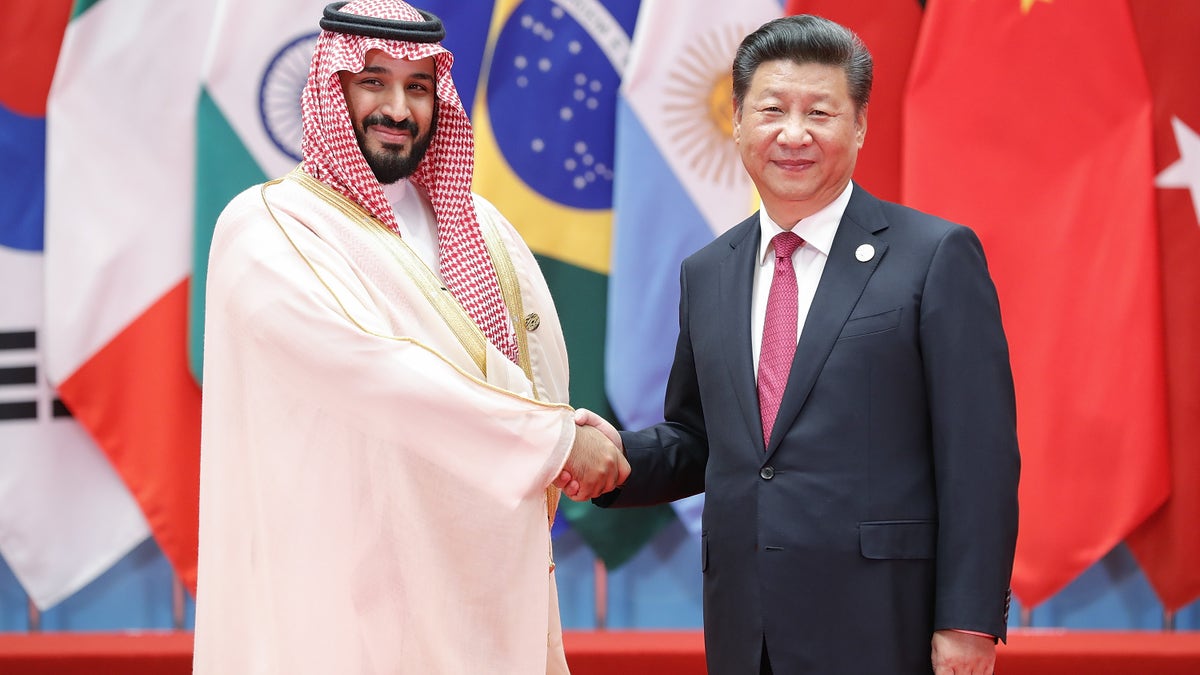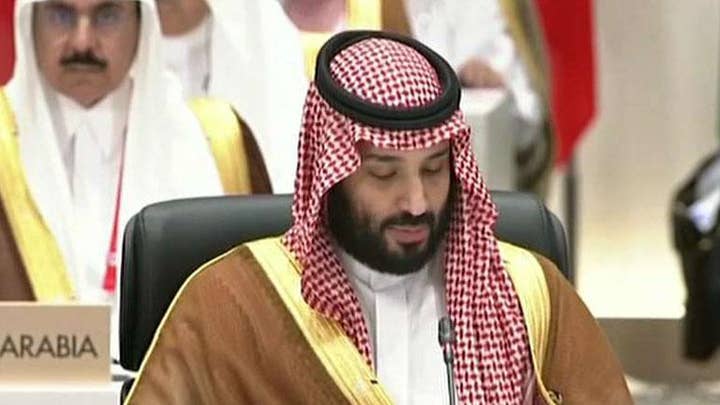President Biden fist bumps Saudi Arabian Crown Prince Mohammed bin Salman
Biden, arriving to his meeting, fist bumps Saudi Arabian Crown Prince Mohammed bin Salman
RIYADH, Saudi Arabia – The controversial photo of the awkward fist bump between Saudi Crown Prince Mohammed bin Salman and President Biden last month stirred a wide range of reaction across the globe.
Only a few weeks before Biden's visit, it was announced Chinese President Xi Jinping was also looking to visit the kingdom.
According to regional analysts, this points to a clear message: The world order has changed, and Beijing is watching closely and has slowly been moving in on regional U.S. ally Saudi Arabia.
"America’s relationship with Saudi Arabia is critical to maintaining stability in the Middle East," Gordon Chang, an expert on China and a senior fellow at the Gatestone Institute, told Fox News Digital.
STATE DEPARTMENT APPROVES POTENTIAL SALE OF 300 PATRIOT MISSILES TO SAUDI ARABIA

Chinese President Xi Jinping (right) shakes hands with Saudi Arabian Crown Prince Mohammed bin Salman at the G20 Summit Sept. 4, 2016, in Hangzhou, China. At the time of the photo, Mohammed bin Salman was Deputy Crown Prince and Minister of Defense. (Lintao Zhang/Getty Images)
"The Biden administration, however, has adopted policies that seem designed to alienate the kingdom, thereby driving Riyadh into the hands of Beijing."
The Chinese leader is expected to arrive in the coming months, according to Chinese sources. His visit will come at a time of strengthening relationships with Saudi Arabia on multiple fronts, including oil and energy products and growing military sales.
"Saudi Arabia views China as a future strategic partner, weaving strong relations with the kingdom in the most important sectors, such as the energy sector, military aspects and economic investments in both the medium and long run," Salem Al-Yami told Fox News Digital. Al-Yami is a former advisor to the Saudi foreign ministry.
The China-Saudi military alliance is a growing one. Between 2016 and 2020, Chinese arms transfers to Saudi Arabia increased 386%, according to a report by the German Institute for International and Security Affairs.

In this photo provided by the Saudi Press Agency, firefighters try to extinguish a blaze at an Aramco terminal in the southern border town of Jizan, Saudi Arabia, March 20, 2022. (Saudi Press Agency via AP)
Despite the growing interest in military cooperation, it's expected energy will be on top of Xi's agenda with China being Saudi Arabia’s biggest oil importer. This also coincides with what some observers say was a failed attempt by Biden to secure an oil deal with the Kingdom in order to lower inflation and gas prices in the U.S.
Xi's expected visit to the world's top oil exporter comes amid turmoil in global energy markets as a result of Russia's invasion of Ukraine and Russia facing international sanctions on its energy trade. Beijing and Riyadh already have significant trading connections, and the two nations are even reportedly exploring the negotiation of oil sales in China's currency, the Yuan, rather than dollars.
Reuters reported that Russia overtook Saudi Arabia last month for the second month in a row as China's top oil supplier, yet China continues to be its best customer for the product.
Earlier this month, Saudi oil giant Aramco and China Petroleum & Chemical Corporation (Sinopec) signed a memorandum of understanding to collaborate within Saudi Arabia. They agreed to collaborate on issues relating to the oil industry as well as carbon capture and the development of hydrogen as an energy source.
They will also talk about establishing a manufacturing hub in the King Salman Energy Park in eastern Saudi Arabia, according to Aramco.

A flame burns off waste gas at Saudi Aramco's Ras Tanura oil refinery and terminal in Ras Tanura, Saudi Arabia in October 2018. (Simon Dawson/Bloomberg via Getty Images)
Commercial and investment cooperation between Saudi Arabia and China has also increased significantly, and the prospects for future cooperation in this field are promising, according to an expert on industrial investment at Saudi oil giant Aramco.
"Oil is the most prominent activity between the two countries," Al-Yami said. He noted that "China has an insatiable appetite for more energy, and Saudi Arabia needs China in many ways, making a strategic future bilateral partnership inevitable."
CHINA INCREASES MIDDLE EAST INVESTMENT AS US BACKS OUT OF REGION
According to Saudi customs data, Saudi Arabia maintained its top ranking in Chinese oil supplies in 2021, with supplies up 3.1% over 2020, and it expanded its share to 17% of overall Chinese imports.
Additionally, figures from the Saudi General Administration of Customs showed that China imported 87.58 million tonnes of crude oil from the kingdom, or 1.75 million barrels per day.
Saudi-Chinese relations have been on the upswing for several years with Saudi Arabia being China's top commercial partner in the region in 2020 and imports and exports totaling more than $67 billion. The two nations are collaborating on renewable energy, finance and infrastructure initiatives, as well as armaments manufacture.
In addition, according to the United Nations Comtrade database on international trade, Chinese exports to Saudi Arabia amounted $30.32 billion during 2021.
There is significant interest from both ends of the Saudi-Chinese spectrum to further develop and capitalize on this relatively new partnership. Although Saudi Arabia is undergoing the process of shifting to a non-oil economy per its Saudi 2030 vision, mutual trade in all fields between the countries should see an ongoing long-term presence.
The arrival of the Chinese president to Saudi Arabia is yet to set the tone of how the relations between the two countries are will grow in the future, although most observers point to it positively.
CLICK HERE TO GET THE FOX NEWS APP
"There is a real interest in developing aspects of cooperation that include all fields, and Saudi Arabia and China are mutually enthusiastic about this," Salem said. "There seems to be no interest in a Western reaction resulting from this partnership."
Last month, a Chinese Foreign Ministry’s statement described Saudi Arabia as China's "strategic partner."









































